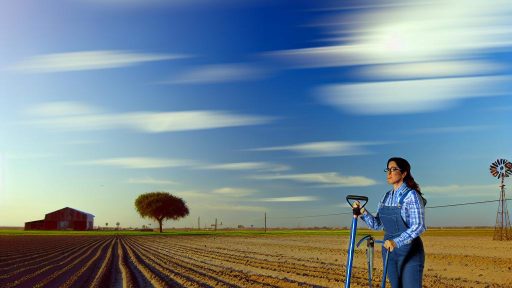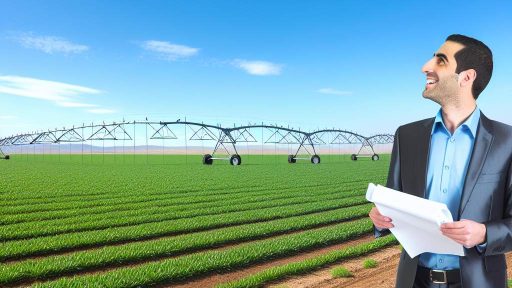Introduction to Sustainable Farming and Climate-Friendly Practices
Defining Sustainable Farming
Sustainable farming focuses on producing food without depleting resources.
This practice considers environmental health, social equity, and economic profitability.
Farmers engage in methods that protect ecosystems and preserve farmland.
Essentially, it aims for a balance between agricultural needs and ecological preservation.
The Importance of Climate-Friendly Practices
Climate-friendly practices reduce greenhouse gas emissions in agriculture.
These methods promote resilience against climate change impacts.
For instance, crop rotation enhances soil health and reduces pests.
Additionally, cover crops can prevent erosion and improve soil structure.
Financial Gains from Sustainable Practices
Sustainable farming often leads to reduced input costs over time.
Using organic fertilizers minimizes reliance on costly chemical inputs.
Moreover, farmers can benefit from premium prices for organic produce.
Such practices also improve yield stability, leading to more predictable income.
Community and Market Support
Consumers increasingly support local and sustainable products.
This demand can foster community ties and boost local economies.
Farmers who adopt sustainable practices often find new market opportunities.
Transform Your Agribusiness
Unlock your farm's potential with expert advice tailored to your needs. Get actionable steps that drive real results.
Get StartedFor example, joining cooperative organizations can enhance distribution networks.
Financial Benefits of Sustainable and Climate-Friendly Farms
Cost Savings on Inputs
Sustainable farms often reduce costs by minimizing chemical inputs.
They utilize natural alternatives, which are generally less expensive.
Additionally, these farms often incorporate crop rotation and polyculture.
Such methods improve soil health and reduce the need for fertilizers.
Access to Premium Markets
Sustainable and climate-friendly farms can access premium markets.
Consumers increasingly seek organic and sustainably grown products.
This demand allows farmers to charge higher prices for their products.
Consequently, this enhances their profit margins significantly.
Government Incentives and Grants
Various governments offer incentives for sustainable practices.
Farmers can apply for grants aimed at eco-friendly initiatives.
These funds can significantly offset the costs of transitioning to sustainable practices.
Moreover, policies often favor eco-conscious farmers in support programs.
Long-Term Resilience
Sustainable farms are generally more resilient to climate change.
By practicing climate-smart agriculture, farmers enhance their productivity.
Such resilience can lead to consistent income year-round.
Less reliance on external inputs leads to greater financial stability.
Attracting Investment Opportunities
Investors increasingly support sustainable agricultural ventures.
This interest can lead to better funding opportunities for farmers.
Access to capital can facilitate the adoption of innovative technologies.
Consequently, farmers can increase their productivity and efficiency.
Enhanced Soil Fertility
Practices such as cover cropping boost soil fertility.
This leads to decreased need for chemical fertilizers over time.
Healthier soil also results in better crop yields.
Showcase Your Farming Business
Publish your professional farming services profile on our blog for a one-time fee of $200 and reach a dedicated audience of farmers and agribusiness owners.
Publish Your ProfileThus, this practice translates to improved financial outcomes for farmers.
Reduced Energy Costs
Sustainable farms often embrace renewable energy sources.
Using solar or wind energy can significantly cut energy costs.
Farmers can reinvest those savings into further sustainable practices.
Additionally, this shift reduces dependence on fossil fuels.
Cost Savings Through Reduced Inputs and Resource Efficiency
Reduction in Chemical Inputs
Sustainable farming practices often minimize the need for chemical fertilizers and pesticides.
This reduction leads to significant cost savings for farmers.
For example, farms using organic methods can cut fertilization expenses by up to 30%.
Additionally, healthier soil increases crop yields, minimizing the need for further inputs.
Water Conservation Strategies
Many sustainable farms implement advanced irrigation techniques.
Methods like drip irrigation ensure efficient water use.
This efficiency can lower water bills substantially.
Moreover, rainwater harvesting systems provide alternative water sources.
Improved Energy Efficiency
Sustainable farms often integrate renewable energy sources.
Solar panels and wind turbines reduce reliance on grid electricity.
Consequently, energy costs can drop significantly.
Furthermore, energy-efficient machinery reduces fuel consumption.
Enhanced Soil Health and Productivity
Healthy soils lead to better crop yields and lower input needs.
Practices like crop rotation and cover cropping improve soil structure.
These methods promote nutrient cycling, reducing fertilization needs.
As a result, farmers experience lower operating costs over time.
Long-Term Sustainability and Profits
While initial investments might be higher, sustainable practices yield long-term profits.
Farmers benefit from increased resilience against climate change impacts.
This adaptability enhances farm viability and reduces risk.
Sustainable farming presents numerous financial advantages.
Uncover the Details: Farmers’ Solutions to Climate Change Impacts
Access to Premium Markets for Organic and Sustainable Products
Understanding Premium Markets
Premium markets offer significant price advantages.
These markets cater specifically to consumers seeking organic and sustainable products.
Additionally, they often prioritize quality over quantity.
Benefits of Accessing Premium Markets
Farmers gain higher profit margins by targeting premium consumers.
This strategy enhances overall farm profitability and financial security.
Moreover, premium markets provide opportunities for brand differentiation.
Identifying Target Consumers
Understanding consumer preferences is essential for success.
Health-conscious individuals often seek organic products.
Additionally, environmentally-aware consumers value sustainability.
This understanding allows farmers to tailor their products accordingly.
Building Relationships with Retailers
Developing strong partnerships with retailers is crucial.
Retailers focused on organic and sustainable goods can offer valuable access.
Establishing these connections enhances visibility for farmers’ products.
Marketing Strategies for Premium Products
Effective marketing is key to reaching premium consumers.
Showcase Your Farming Business
Publish your professional farming services profile on our blog for a one-time fee of $200 and reach a dedicated audience of farmers and agribusiness owners.
Publish Your ProfileFarmers should employ storytelling to highlight their sustainability efforts.
Social media platforms can amplify outreach and engagement.
Additionally, participation in local farmers’ markets can attract consumers.
Case Studies of Successful Farmers
Farmers like Sarah Green have thrived in premium markets.
Her organic vegetable farm successfully captured consumer interest.
Similarly, Tom Rivera’s sustainable dairy business has increased profits.
These examples showcase the potential benefits of targeting premium consumers.
Uncover the Details: Managing Excess Water: Tools and Techniques for Farmers
Government Incentives and Subsidies for Climate-Friendly Practices
Introduction to Government Programs
Government incentives play a critical role in promoting sustainable farming.
These programs aim to encourage farmers to adopt climate-friendly practices.
Furthermore, they provide financial assistance to help offset initial implementation costs.
Types of Incentives Available
Farmers can access several types of government incentives.
Direct payment programs offer cash to farmers who implement sustainable methods.
Loan programs provide low-interest funding for purchasing eco-friendly equipment.
Tax credits reduce tax liability for expenses associated with sustainable practices.
Subsidies for Research and Development
Research grants support innovation in sustainable agriculture.
Government funding fosters development of new technologies and methods.
Additionally, these subsidies encourage collaborations between agricultural researchers and farmers.
Impact of Incentives on Farmer’s Profitability
Government incentives significantly enhance farm profitability.
By reducing operational costs, they allow farmers to reinvest in their businesses.
Sustainable practices can lead to higher yields and lower input costs.
Success Stories of Climate-Friendly Farms
Numerous farms have successfully adopted climate-friendly practices.
For example, Williams Family Farm reduced irrigation costs by 30% through sustainable methods.
Similarly, Green Valley Acres achieved a significant increase in crop quality.
Such success stories inspire other farmers to seek government assistance.
Challenges in Accessing Incentives
Despite the benefits, challenges exist in accessing these incentives.
Complex application processes often discourage participation.
Moreover, some farmers lack awareness of available programs.
Streamlining these processes can boost overall participation.
Future Directions for Climate-Friendly Farming
The future looks promising for climate-friendly agriculture.
Increased funding for sustainable practices may become a priority.
Moreover, partnerships between governments and organizations will likely expand.
Ongoing education and outreach efforts will enhance program awareness.
Gain More Insights: Innovative Drainage Solutions for Modern Agriculture
Increased Resilience to Climate Change
Adapting to Climate Variability
Climate change significantly impacts agricultural systems worldwide.
Sustainable farming practices adeptly mitigate these effects.
For instance, crop rotation enhances soil health and fertility.
This improves resilience against climactic shifts.
Moreover, cover crops protect against erosion and nutrient depletion.
Farmers can recover more quickly after extreme weather events.
Showcase Your Farming Business
Publish your professional farming services profile on our blog for a one-time fee of $200 and reach a dedicated audience of farmers and agribusiness owners.
Publish Your ProfileEconomic Advantages of Resilience
Resilient farms reduce costs associated with crop failures.
Insurance premiums may decrease as risks diminish.
Higher yields result from improved farming techniques.
Consequently, farmers enjoy enhanced profitability.
Investing in sustainable practices leads to long-term economic gain.
For example, agroforestry systems diversify income streams.
Access to New Markets
Consumers increasingly favor sustainable products.
Farmers adopting climate-friendly methods tap into these markets.
Certification programs promote their sustainable practices.
This boosts farm visibility among eco-conscious consumers.
As a result, farmers can command higher prices for their goods.
Government Support and Funding
Many governments encourage sustainable farming through incentives.
Grants and subsidies support the transition to eco-friendly practices.
Programs like the Conservation Stewardship Program reward adaptability.
Such support eases financial burdens on farmers.
In turn, they invest more in their farms’ long-term health.
See Related Content: Mitigating Greenhouse Gases through Smart Agriculture

Long-term Sustainability Leading to Better Land Value and Investment
Enhancing Land Value Through Sustainable Practices
Sustainable farming enhances the value of agricultural land over time.
This approach allows farmers to improve soil health significantly.
As soil quality increases, land becomes more productive.
Additionally, sustainable practices reduce erosion and preserve land integrity.
Consequently, the long-term benefits lead to higher property values.
Attracting Investment in Sustainable Agriculture
Investors seek opportunities in sustainable farms due to their growth potential.
Such farms often exhibit resilience against climate-related challenges.
Furthermore, sustainable farming practices align with social responsibility goals.
This alignment attracts ethical investors and funding sources.
A growing consumer preference for eco-friendly products also boosts investment appeal.
Accessing Market Premiums for Sustainable Products
Sustainable farms can command premium prices for their products.
Consumers are increasingly willing to pay more for organic and local goods.
This trend translates to increased revenue for sustainable farming operations.
Moreover, unique marketing strategies highlight sustainability credentials.
As a result, these farms can tap into niche markets effectively.
Building Resilience to Market Ups and Downs
Sustainable farms often demonstrate greater resilience in economic downturns.
This resilience stems from diversified production and local sales strategies.
Additionally, sustainable practices can reduce input costs over time.
Lower costs contribute to stable profit margins even during challenging periods.
Consequently, farmers can maintain their livelihoods longer.
Case Studies Showcasing Financial Success of Sustainable Farms
Agricultural Innovations in Green Valley Farm
Green Valley Farm demonstrates impressive financial success through sustainable practices.
The farm implemented crop rotation and intercropping methods.
As a result, they increased yields without relying on chemical fertilizers.
Showcase Your Farming Business
Publish your professional farming services profile on our blog for a one-time fee of $200 and reach a dedicated audience of farmers and agribusiness owners.
Publish Your ProfileThis approach not only boosted profits but also improved soil health.
Consequently, they reduced costs associated with purchasing fertilizers.
Farmers reported a significant rise in both revenue and sustainability ratings.
Success Story of EcoHarvest Co.
EcoHarvest Co. specializes in organic produce and sustainable farming techniques.
The company adopted precision agriculture technology to optimize resources.
This investment led to reduced water consumption and minimized waste.
Additionally, they increased market access for their products.
Consumers are increasingly willing to pay premium prices for organic goods.
Thus, EcoHarvest Co. experienced a 25% revenue growth over three years.
Farmers United Initiative
Farmers United Initiative highlights collective efforts among local farms.
This collaborative approach emphasizes shared resources and knowledge exchange.
The initiative introduced composting and renewable energy systems.
These practices significantly decreased operational costs for members.
Moreover, participating farms saw improvements in product quality.
Enhanced quality led to higher prices and better market positioning.
Financial Incentives and Government Support
Government programs increasingly support sustainable farming initiatives.
Grants and subsidies are available for farmers transitioning to eco-friendly practices.
These incentives help reduce the financial burden of adopting new technologies.
Additionally, community engagement fosters a positive public image.
Local customers value and support sustainable businesses.
As a result, these farms can enjoy both financial and social rewards.
Challenges and Financial Risks in Transitioning to Sustainable Practices
Initial Investment and Capital Constraints
Transitioning to sustainable farming requires significant initial investment.
Farmers often face capital constraints that hinder their ability to make necessary changes.
Funding sources for sustainable practices may not always be readily available.
Furthermore, high upfront costs can create financial strain for many farmers.
Market Uncertainties
The market for sustainable products may not yet be fully developed.
This uncertainty can lead farmers to hesitate when transitioning.
Additionally, fluctuations in consumer demand can impact profitability.
Farmers might also struggle to find reliable markets for their sustainable goods.
Learning Curve and Knowledge Gaps
The shift to sustainable practices involves a steep learning curve.
Farmers often need to acquire new skills and knowledge.
Training programs may be limited or unavailable in certain regions.
This lack of resources can leave farmers feeling unsupported in their efforts.
Regulatory Hurdles
Navigating regulations can be challenging and time-consuming.
Farmers may encounter bureaucratic obstacles when adopting new practices.
Compliance with environmental regulations can lead to increased costs.
In some cases, regulations may not support sustainable farming initiatives.
Risk of Crop Failure
Transitioning to new farming methods carries the risk of crop failure.
Farmers may face losses if new practices do not yield expected results.
Additionally, changing weather patterns can exacerbate these risks.
Showcase Your Farming Business
Publish your professional farming services profile on our blog for a one-time fee of $200 and reach a dedicated audience of farmers and agribusiness owners.
Publish Your ProfileFarmers must weigh the potential for failure against the benefits of sustainability.
Lack of Community Support
Community engagement is crucial during the transition process.
However, farmers may experience a lack of support from their communities.
Some community members may resist change, valuing traditional practices.
This lack of support can further isolate farmers seeking to adopt sustainable methods.
Additional Resources
Do environmentally-friendly cocoa farms yield social and economic …
Climate Change Impacts on Agriculture and Food Supply | US EPA




